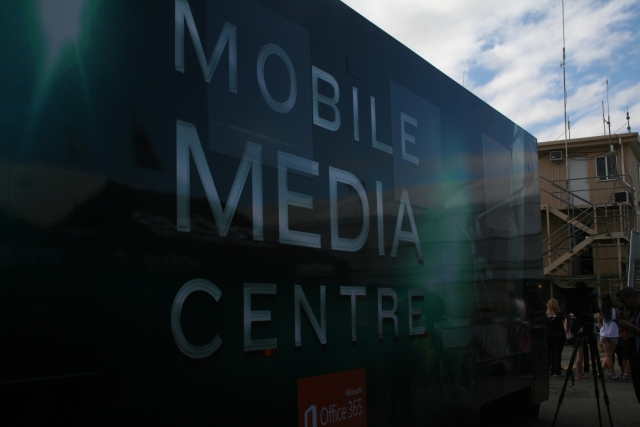“We bring in almost everything,” says V8 Supercars director Mark Perry as he guided journalists around Launceston’s Symonds Plains racing track.
Everything Mark showed us – a fleet of trucks, communications equipment, hospitality tents and the racing teams themselves would be packed up on Sunday night, shipped to Melbourne and flown to New Zealand for the next race.
The V8 Supercar management are very proud of their work, and they should be given the massive task they have, but it exposes a weakness in the Tasmanian economy in that almost all the high value employment and equipment has to be flown in.
Quiet times in downtown Launceston
Arriving into Launceston on the Friday before the races, it’s interesting how little hype there is around the event. In Sydney, San Francisco or Cannes there would be banners and flags around the city welcoming visitors, in Launceston there’s almost nothing despite the race meeting being one of the state’s biggest events.
It was also surprising how there were no downtown events to complement the main attraction.
Almost every major sporting event from the Olympic Games and FIFA World Cup to the AFL Grand Final and Australian Open has some inner city satellite venues with big screens for the locals who can’t make it to the stadium.
Having those satellite events adds to the buzz and hype in the host city. Something that downtown Launceston needs at 7pm on a Friday night.
That lack of support by the community is notable, particularly in light of the $600,000 per year the cash strapped Tasmanian government pays in subsidies for the V8 Supercars.
I’m against government support for events like these, but if that money is going to spent it may as well be spent properly to maximise the economic benefits.
Subsidies like this would be even better if they were part of some grander economic plan, but like all the payments given to the film production, motor manufacturing and other industries, they are based more on populism than any strategy – the politicians may as well be giving free beer out in Launceston’s main street.
Why the community support is so tepid for the Supercars event is so tepid is something I’m going to be exploring in the next few days as I meet various business leaders in Launceston and Hobart to hear how the state is positioning itself in the 21st Century.
In the meantime, the V8 Supercars “travelling circus” has moved on, hopefully Tassie will have some more long term jobs to show for it.
Paul travelled to Tasmania and the V8 Supercars courtesy of Microsoft Australia






